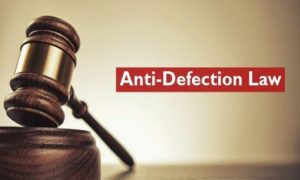Anti-Defection Law:

Last week, Bahujan Samaj Party (BSP) chief Mayawati called for a more stringent anti-defection law amid a string of politicians switching parties ahead of the Uttar Pradesh assembly election beginning next month.
- The practice of politicians deserting parties just ahead of elections is not unusual. And every time there are defections, the anti-defection law, which penalises individual lawmakers for switching parties, comes into the picture.
- Tenth Schedule of the Indian Constitution Popularly known as the anti-defection law.
- It specifies the circumstances under which changing of political parties by legislators invites action under the law.
- It was added to the Constitution by the 52nd Amendment Act.
- It includes situations in which an independent MLA, too, joins a party after the election.
- The law covers three scenarios with respect to shifting of political parties by an MP or an MLA. These include:
- When a member elected on the ticket of a political party “voluntarily gives up” membership of such a party or votes in the House against the wishes of the party.
- When a legislator who has won his or her seat as an independent candidate joins a political party after the election.
- In the above two cases, the legislator loses the seat in the legislature on changing (or joining) a party.
- Relates to nominated MPs. In their case, the law gives them six months to join a political party, after being nominated. If they join a party after such time, they stand to lose their seat in the House.
- Under the anti-defection law, the power to decide the disqualification of an MP or MLA rests with the presiding officer of the legislature.
- The law does not specify a time frame in which such a decision has to be made.
- Last year, the Supreme Court observed that anti-defection cases should be decided by Speakers in three months’ time.
- However, Legislators may change their party without the risk of disqualification in certain circumstances. Exceptions:
- The law allows a party to merge with or into another party provided that at least two-thirds of its legislators are in favour of the merger.
- On being elected as the presiding officer of the House, if a member, voluntarily gives up the membership of his party or rejoins it after he ceases to hold that office, he won’t be disqualified.




